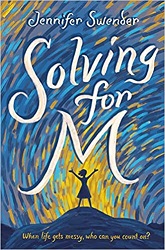
 Solving for M
Solving for MReview posted February 28, 2021.
Crown Books for Young Readers, 2019. 243 pages.
Review written January 27, 2021, from a library book
2020 Mathical Book Prize Award Winner, Ages 8-10
This book begins with Mika starting middle school in 5th grade and wondering why her math teacher insists on them keeping a math journal. She doesn’t think of herself as a numbers person, but as an art person. Still, her art teacher tells them “Drawing isn’t in the 5th grade curriculum” and instead they make collages from found objects. She does more drawing in math class than in art class.
And the book takes us through Mika’s year with the unconventional math teacher, new friends, and pages from Mika’s math journal, which mostly give a nice visual explanation of math concepts. Mika’s mother, unfortunately, has a medical incident and may have cancer, and then that cancer may have spread, so when Mika thinks about probability, that’s what’s on her mind.
I’m not sure I would have liked having to do a math journal instead of just solving problems when I was in 5th grade. But this makes a nice book for kids who don’t, actually, think of themselves as numbers people. It shows how much math is part of life. And Mika’s story is a good one, trying to cope with her mother’s diagnosis and make new friends with her former best friend assigned to a different pod.
There is, alas, one error in the portrayed journal pages! The book is so good except for that!
When the class is talking about subsets, Mika draws pictures of various sets and subsets. These are shown on pages 135 and 136. In the first one, she’s got a picture of her Mom in a Melanoma Support Group. Set A = Mom, old guy 1, old guy 2, old guy 3, old guy 4. Then she’s got new brackets around the picture of her mother and says Set B = Mom.
But alas! In the subset notation, it says that A is a subset of B, instead of what it should be, the other way around! This has strong potential to confuse lots of kids. It’s the *only* math mistake in the book, and not a major plot point, and I really really really hope they will fix it in subsequent printings. Once that mistake is put right, it’s a wonderful book that kids will enjoy and that might open their minds about math!
I admit, I’m surprised it won a Mathical Prize with that error in there. Though the library tends to buy early printings, so maybe it did get fixed? And it’s one tiny error and they shouldn’t hold against it the beautiful demonstration of how math is part of life and artists can help make that understandable. Also, I'm sure the committee appreciated the bigger picture that this book shows that it doesn't take some kind of natural-born genius to enjoy and appreciate math.
